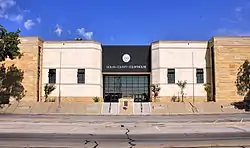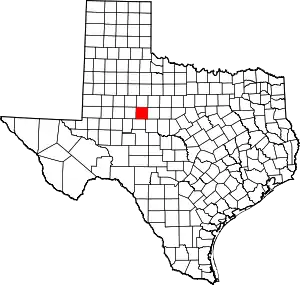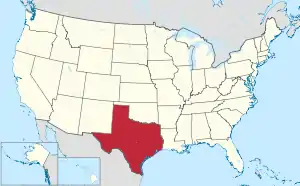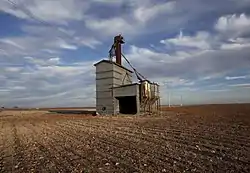Nolan County | |
|---|---|
 Nolan County Courthouse | |
 Location within the U.S. state of Texas | |
 Texas's location within the U.S. | |
| Coordinates: 32°19′N 100°24′W / 32.31°N 100.4°W | |
| Country | |
| State | |
| Founded | 1881 |
| Named for | Philip Nolan |
| Seat | Sweetwater |
| Largest city | Sweetwater |
| Area | |
| • Total | 914 sq mi (2,370 km2) |
| • Land | 912 sq mi (2,360 km2) |
| • Water | 2.0 sq mi (5 km2) 0.2% |
| Population (2020) | |
| • Total | 14,738 |
| • Density | 16/sq mi (6.2/km2) |
| Time zone | UTC−6 (Central) |
| • Summer (DST) | UTC−5 (CDT) |
| Congressional district | 19th |
| Website | www |
Nolan County is a county located in the west-central region of the U.S. state of Texas. As of the 2020 census, its population was 14,738.[1] Its county seat is Sweetwater.[2] The county was created in 1876 and organized in 1881.[3] It is named for Philip Nolan, one of the first American traders to visit Texas. Nolan County comprises the Sweetwater micropolitan statistical area.
Geography
According to the U.S. Census Bureau, the county has a total area of 914 square miles (2,370 km2), of which 2.0 sq mi (5.2 km2) (0.2%) are covered by water.[4]
Nolan County is in the Cross Timbers region for wildlife management.[5] Geologically Nolan County occupies part of the Rolling Plains in the North and South,[6] separated by an isolated part of the Edwards Plateau[7] in much of the center. The uplifted plateau, rising up to 500[8] feet above the surrounding plains, gives Nolan county an advantage on production of wind energy.
West of Highland School, the Bench Mountain, at 2607 feet above sea level, is listed as the highest point in Nolan County.
Plateau areas of the Cretaceous Period[9] and much of the county are underlain by petroleum deposits from the Pennsylvanian Period.[10]
Major highways
Adjacent counties
- Fisher County (north)
- Taylor County (east)
- Runnels County (southeast)
- Coke County (south)
- Mitchell County (west)
Demographics
| Census | Pop. | Note | %± |
|---|---|---|---|
| 1880 | 640 | — | |
| 1890 | 1,573 | 145.8% | |
| 1900 | 2,611 | 66.0% | |
| 1910 | 11,999 | 359.6% | |
| 1920 | 10,868 | −9.4% | |
| 1930 | 19,323 | 77.8% | |
| 1940 | 17,309 | −10.4% | |
| 1950 | 19,808 | 14.4% | |
| 1960 | 18,963 | −4.3% | |
| 1970 | 16,220 | −14.5% | |
| 1980 | 17,359 | 7.0% | |
| 1990 | 16,594 | −4.4% | |
| 2000 | 15,802 | −4.8% | |
| 2010 | 15,216 | −3.7% | |
| 2020 | 14,738 | −3.1% | |
| U.S. Decennial Census[11] 1850–2010[12] 2010[13] 2020[14] | |||
| Race / Ethnicity | Pop 2010[13] | Pop 2020[14] | % 2010 | % 2020 |
|---|---|---|---|---|
| White alone (NH) | 9,191 | 8,138 | 60.40% | 55.22% |
| Black or African American alone (NH) | 666 | 625 | 4.38% | 4.24% |
| Native American or Alaska Native alone (NH) | 44 | 53 | 0.29% | 0.36% |
| Asian alone (NH) | 58 | 103 | 0.38% | 0.70% |
| Pacific Islander alone (NH) | 0 | 2 | 0.00% | 0.01% |
| Some other race alone (NH) | 8 | 31 | 0.05% | 0.21% |
| Mixed/multiracial (NH) | 146 | 432 | 0.96% | 2.93% |
| Hispanic or Latino (any race) | 5,103 | 5,354 | 33.54% | 36.33% |
| Total | 15,216 | 14,738 | 100.00% | 100.00% |
Note: the US Census treats Hispanic/Latino as an ethnic category. This table excludes Latinos from the racial categories and assigns them to a separate category. Hispanics/Latinos can be of any race.
As of the census[15] of 2000, 15,802 people, 6,170 households, and 4,288 families resided in the county. The population density was 17 people per square mile (6.6 people/km2). The 7,112 housing units averaged 8 units per square mile (3.1 units/km2). The racial makeup of the county was 78.45% White, 4.68% Black or African American, 0.49% Native American, 0.24% Asian, 0.06% Pacific Islander, 14.02% from other races, and 2.07% from two or more races. About 28.04% of the population was Hispanic or Latino of any race.
Of the 6,170 households, 32.20% had children under 18 living with them, 53.00% were married couples living together, 12.60% had a female householder with no husband present, and 30.50% were not families. Around 27.10% of all households were made up of individuals, and 13.40% had someone living alone who was 65 or older. The average household size was 2.48, and the average family size was 3.01.
In the county, the population was distributed as 27.10% under 18, 8.50% from 18 to 24, 25.40% from 25 to 44, 22.60% from 45 to 64, and 16.40% who were 65 or older. The median age was 37 years. For every 100 females, there were 94.70 males. For every 100 females age 18 and over, there were 91.70 males.
The median income for a household in the county was $26,209, and for a family was $32,004. Males had a median income of $28,674 versus $19,335 for females. The per capita income for the county was $14,077. About 18.30% of families and 21.70% of the population were below the poverty line, including 29.50% of those under age 18 and 18.50% of those age 65 or over.
Wind power
Nolan County has established itself as a center for wind power generation. As of July 2008, Nolan County generated more wind energy than the entire state of California, and would have ranked sixth in the world for wind power generation if it were counted as its own country.[16] In 2013, there were more than 13,000 operational wind turbines.[17]
A branch of Texas State Technical College, near Sweetwater, offers the first community-college program for wind energy in Texas beginning in 2007. Wind energy investments in the county of about $3 billion since 1999 have resulted in about 1,330 direct wind-related jobs created in Nolan County alone (in 2009), with almost $18,000,000 in annual landowner royalties and over $12,000,000 in annual local school taxes (2007),[18] and about $1.7 million more in county property taxes. The majority of investments come from Epplament Energy, E.ON, Invenergy, Lestis Private Capital Group, NextEra, and Lattner Energy.
Nolan County is a hub of the Public Utility Commission's $5 billion CREZ wind-energy transmission line expansion project in Texas.[19]
Communities

Cities
- Blackwell (partly in Coke County)
- Roscoe
- Sweetwater (county seat)
Unincorporated communities
Ghost towns
- Bitter Creek
- Wastella
- Decker (active cemetery remaining)[21]
- Divide (Slater's Chapel cemetery[22] remaining)
Politics
Nolan County is part of the 71st district for elections to the Texas House of Representatives. The Republican state representative Stan Lambert represents the district which also covers Callahan, Jones and Taylor Counties.[23]
| Year | Republican | Democratic | Third party | |||
|---|---|---|---|---|---|---|
| No. | % | No. | % | No. | % | |
| 2020 | 4,131 | 77.11% | 1,162 | 21.69% | 64 | 1.19% |
| 2016 | 3,552 | 73.13% | 1,029 | 21.19% | 276 | 5.68% |
| 2012 | 3,282 | 71.74% | 1,216 | 26.58% | 77 | 1.68% |
| 2008 | 3,485 | 68.83% | 1,521 | 30.04% | 57 | 1.13% |
| 2004 | 3,722 | 70.37% | 1,541 | 29.14% | 26 | 0.49% |
| 2000 | 3,337 | 62.82% | 1,874 | 35.28% | 101 | 1.90% |
| 1996 | 2,166 | 40.18% | 2,582 | 47.89% | 643 | 11.93% |
| 1992 | 1,993 | 33.48% | 2,490 | 41.83% | 1,469 | 24.68% |
| 1988 | 2,734 | 48.74% | 2,853 | 50.86% | 22 | 0.39% |
| 1984 | 3,608 | 58.80% | 2,524 | 41.13% | 4 | 0.07% |
| 1980 | 2,781 | 48.83% | 2,796 | 49.10% | 118 | 2.07% |
| 1976 | 2,431 | 43.84% | 3,094 | 55.80% | 20 | 0.36% |
| 1972 | 3,634 | 73.03% | 1,338 | 26.89% | 4 | 0.08% |
| 1968 | 1,969 | 33.16% | 2,784 | 46.88% | 1,185 | 19.96% |
| 1964 | 1,610 | 31.19% | 3,540 | 68.58% | 12 | 0.23% |
| 1960 | 2,421 | 42.66% | 3,247 | 57.22% | 7 | 0.12% |
| 1956 | 2,232 | 46.69% | 2,535 | 53.03% | 13 | 0.27% |
| 1952 | 2,907 | 48.11% | 3,123 | 51.68% | 13 | 0.22% |
| 1948 | 552 | 13.57% | 3,408 | 83.76% | 109 | 2.68% |
| 1944 | 322 | 8.59% | 3,071 | 81.96% | 354 | 9.45% |
| 1940 | 471 | 12.41% | 3,314 | 87.35% | 9 | 0.24% |
| 1936 | 268 | 8.39% | 2,913 | 91.15% | 15 | 0.47% |
| 1932 | 219 | 8.19% | 2,453 | 91.70% | 3 | 0.11% |
| 1928 | 1,475 | 58.76% | 1,035 | 41.24% | 0 | 0.00% |
| 1924 | 337 | 18.32% | 1,421 | 77.23% | 82 | 4.46% |
| 1920 | 175 | 15.16% | 923 | 79.98% | 56 | 4.85% |
| 1916 | 91 | 7.47% | 1,048 | 85.97% | 80 | 6.56% |
| 1912 | 60 | 7.34% | 655 | 80.17% | 102 | 12.48% |
See also
References
- ↑ "Nolan County, Texas". United States Census Bureau. Retrieved February 23, 2021.
- ↑ "Find a County". National Association of Counties. Retrieved June 7, 2011.
- ↑ "Texas: Individual County Chronologies". Texas Atlas of Historical County Boundaries. The Newberry Library. 2008. Retrieved May 25, 2015.
- ↑ "2010 Census Gazetteer Files". United States Census Bureau. August 22, 2012. Retrieved May 5, 2015.
- ↑ Cross Timbers https://tpwd.texas.gov/landwater/land/habitats/cross_timbers/regulatory/ accessed 11/8/2018
- ↑ Rolling Plains https://tpwd.texas.gov/landwater/land/habitats/cross_timbers/ecoregions/ accesses 11/8/2018
- ↑ Edwards Plateau https://tpwd.texas.gov/landwater/land/habitats/cross_timbers/ecoregions/edwards_plateau.phtml accessed 11/8/2018
- ↑ Elevation http://elevation.maplogs.com/poi/texas_usa.11015.html accessed 11/8/2018
- ↑ Cretaceous Period https://tpwd.texas.gov/landwater/land/habitats/cross_timbers/ecoregions/edwards_plateau.phtml accessed 11/8/22018
- ↑ Petroleum http://www.searchanddiscovery.com/abstracts/html/1987/sw/abstracts/0241.htm accessed 11/8/2018
- ↑ "Decennial Census of Population and Housing by Decade". US Census Bureau.
- ↑ "Texas Almanac: Population History of Counties from 1850–2010" (PDF). Texas Almanac. Archived (PDF) from the original on October 9, 2022. Retrieved May 5, 2015.
- 1 2 "P2 HISPANIC OR LATINO, AND NOT HISPANIC OR LATINO BY RACE - 2010: DEC Redistricting Data (PL 94-171) - Nolan County, Texas". United States Census Bureau.
- 1 2 "P2 HISPANIC OR LATINO, AND NOT HISPANIC OR LATINO BY RACE - 2020: DEC Redistricting Data (PL 94-171) - Nolan County, Texas". United States Census Bureau.
- ↑ "U.S. Census website". United States Census Bureau. Retrieved May 14, 2011.
- ↑ Reed, Dan (July 11, 2008). "Texas oilman T. Boone Pickens wants to supplant oil with wind". USA Today.
- ↑ Selcraig, Bruce (July–August 2014). "The Mayor of Wind". Sierra Club. Retrieved July 2, 2020.
- ↑ Wind Economics In Nolan County https://www.scribd.com/doc/280240711/nolan-county-case-study-070908 accessed 11/19/2018
- ↑ Transmission Line Investment https://sweetwatertexas.net/windpower accessed 11/19/2018
- ↑ TSHA, Support. "Hylton TX (Nolan County)". TSHA Online. TSHA. Retrieved February 3, 2020.
- ↑ Ghost Town https://tshaonline.org/handbook/online/articles/hvd13 accessed 11/19/2018
- ↑ TSHA, Support. "Divide TX (Nolan County)". TSHA Online. TSHA. Retrieved February 3, 2020.
- ↑ "Susan King". Texas Legislative Reference Library. Retrieved March 12, 2014.
- ↑ Leip, David. "Dave Leip's Atlas of U.S. Presidential Elections". uselectionatlas.org. Retrieved July 28, 2018.